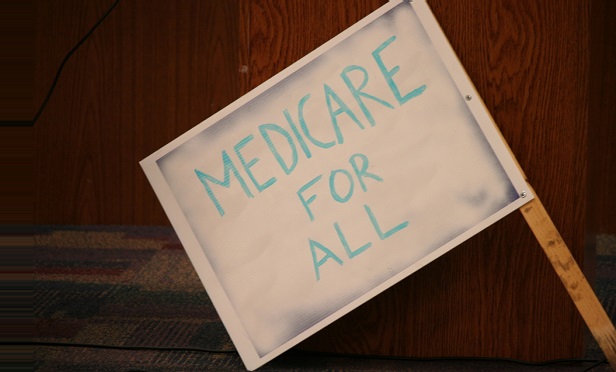 (Photo: Shutterstock)
(Photo: Shutterstock)
A new study published in The Lancet adds to the growing appeal of Medicare for All, estimating that the approach to U.S. healthcare would not only save $450 billion, but would also save more than 68,000 lives from unnecessary death—every year.
The study found that replacing premiums, deductibles, co-payments, and out-of-pocket costs with a progressive tax system would result in thousands of dollars a year in savings for the average family, and would be most beneficial for lower-income households.
Between expansion in coverage and cost savings, the study's authors estimate that a Medicare for All system would cut national healthcare spending by 13 percent, or more than $450 billion annually. In addition, funding the whole system would cost less than the total amount that employers and employees are currently paying for health insurance premiums, combined with the funding provided by existing government allocations for medical premiums.
According to Common Dreams, the latest study earned praise from Sen. Bernie Sanders. "In other words, guaranteeing healthcare as a human right by creating a Medicare for All system will cost substantially less than our current dysfunctional healthcare system," Sanders said. "It will save working-class families thousands of dollars and it will prevent tens of thousands of Americans from dying each year."
Individuals and employers are not the only ones who would benefit from the Medicare for All Act, either, according to the study. Struggling hospitals in low-income communities would no longer have to deal with uncompensated care, and would benefit from the increase of Medicaid rates to match Medicare levels. The hospitals would also be able to cut administrative overhead.
The study "debunks several attacks on Medicare for All from the private healthcare industry," according to Common Dreams, which points out that doctors and hospitals would have more time to spend with patients and have fewer expenses from more streamlined administrative and billing systems.
The study is one of many concluding that a single-payer healthcare system would result in improved health outcomes for Americans while also saving money and cutting waste from the healthcare system.
Another such survey, published in PLOS Medicine earlier this year, looked at studies from the past 30 years and found that 19 out of 22 would decrease costs in the first year and provide significant savings within a decade.
From: BenefitsPro
© Touchpoint Markets, All Rights Reserved. Request academic re-use from www.copyright.com. All other uses, submit a request to [email protected]. For more inforrmation visit Asset & Logo Licensing.



